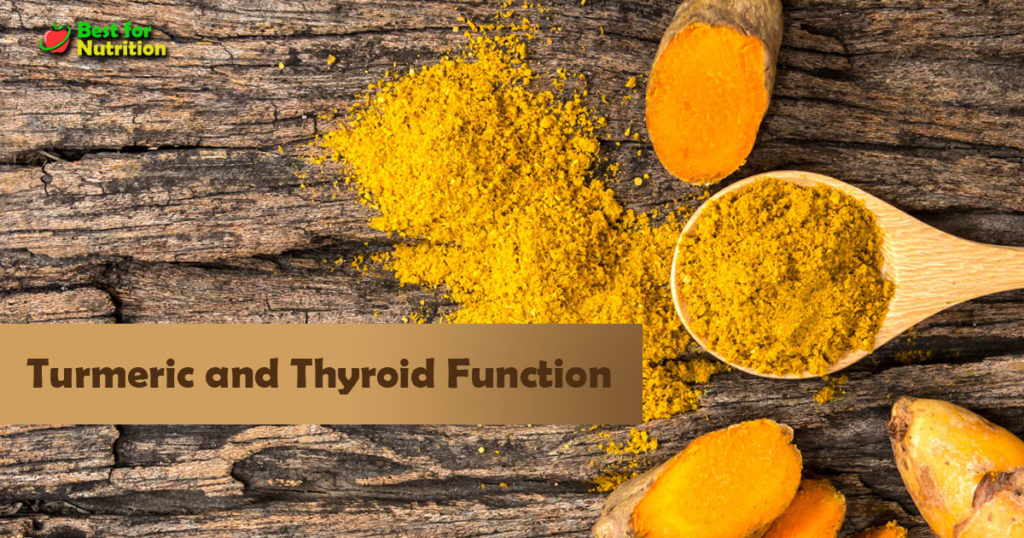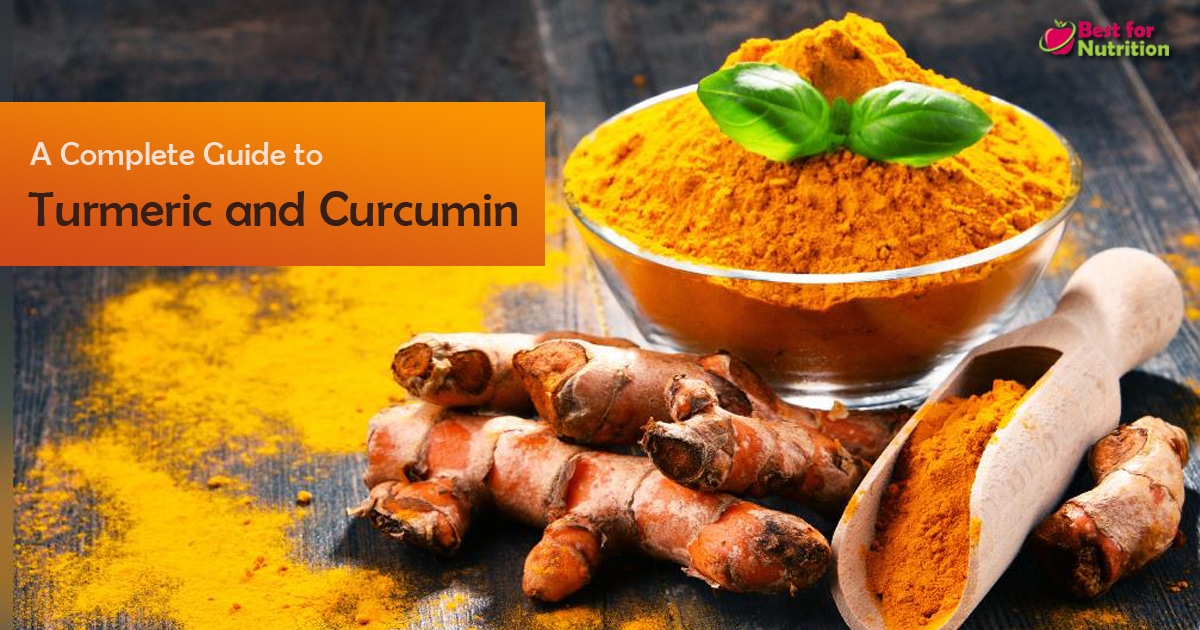There are many natural cures available for our modern life health issues. The overall goal of such natural remedies is generally to address the underlying cause of the condition.
Using turmeric to maintain thyroid function is one such claim that we will evaluate today to see if there is any scientific evidence to support these claims.

Turmeric vs. Curcumin
Turmeric is the root of a plant which is known as Curcuma longa. It is an intriguing ingredient with a rich history. It is used as a dietary spice and herbal supplement in ancient China and India.
On the other hand, curcumin is a polyphenol extracted from the plant Curcuma longa and is widely used in Southeast Asia, China, and India for food preparation and also for medicinal purposes.
Turmeric is an excellent source of curcumin; it contains about 5 to 6% of curcumin (1). It is this compound that lends the peculiar color to the spice turmeric.
It is believed that curcumin has excellent medicinal properties that help to relieve pain and inflammation in various organs of your body.
7 Thyroid Specific Benefits of Turmeric/Curcumin
Turmeric has anti-inflammatory, antioxidant, and antibiotic properties, which have a positive effect on the thyroid gland. Let us discuss various benefits turmeric has on your thyroid health.
Regulates Your Immune System
An autoimmune disease is a condition in which the immune system attacks healthy organs of your body.
Grave’s disease and Hashimoto’s disease are such autoimmune disorders of the thyroid gland. Thyroid hormones variate in this condition resulting in an increased risk of goiter.
Recent studies have revealed that curcumin inhibits these autoimmune diseases by regulating immune cells and inflammatory cytokines. The study also says that the beneficial effects curcumin can be achieved through dietary consumption at low levels for an extended period (2).
According to a study published in 2018, curcumin modulates the molecular pathway involved in the inflammation and in the immune response.
The research suggests curcumin as a supplement therapy or nutritional approach for strengthening your immunity (3).
Summary: Curcumin has an immunomodulatory effect that helps to inhibit autoimmune conditions. It regulates immune cells and cytokines to strengthen your immunity.
Reduces Inflammation
Turmeric has been used as a dietary spice and a topical ointment for the treatment of various inflammations in India for centuries.
Ancient health practitioners of India explain the use of curcumin in inflammatory diseases, wound healing, and abdominal problems.
The oxidative stress and oxidative damage in your body result in chronic inflammation. It is believed that most of the chronic diseases are the outcome of such inflammation.
Studies suggest that curcumin alleviates oxidative stress and inflammation in chronic diseases. It acts by regulating inflammatory and pro-inflammatory pathways related to most chronic diseases (4).
Summary: Turmeric has both antioxidant and anti-inflammatory properties that help to reduce inflammation and maintain thyroid health.
Benefits Hyperthyroidism
Increased production of thyroid hormones leads to hyperthyroidism. In this condition, your body’s metabolism accelerates, leading to unintentional weight loss and irregular heartbeat.
Scientific studies have revealed that curcumin can improve the levels of antioxidant enzymes. It reduces the oxidative stress-induced in the brain due to hyperthyroidism (5).
There is evidence that says oral supplementation of vitamin E and curcumin alleviates hyperthyroidism-induced oxidative stress and restores the liver functions (6).
In a similar manner, turmeric protects your kidney function from hyperthyroidism related risks (7).
Summary: Turmeric or curcumin protects various organs of your body from hyperthyroidism induced organ damage.
Hypothyroidism Benefits
Hypothyroidism is a state in which thyroid glands fail to produce enough hormones. Your body’s metabolism gets slower leading to weight gain, fatigue, and intolerance to cold.
Another symptom of hypothyroidism is high cholesterol levels, which increases the risk of cardiovascular diseases.
A study was conducted to investigate the positive effect of turmeric extract on hypothyroidism. The antioxidant effect of turmeric helps to maintain the thyroid hormone levels. It also reduced the increased cholesterol levels due to hypothyroidism (8).
Another study has revealed that curcumin has a certain impact on treating age-related hypothyroidism and other thyroid problems (9).
Summary: Turmeric regulates thyroid hormone production and protects heart health by reducing cholesterol levels.
Helps Reduce the Risk of Goiter
An abnormal enlargement of the thyroid gland is called a goiter. Coughing and difficulty in breathing are common symptoms of this disease.
A 2015 study published in the Indian Journal of Endocrinology says that turmeric is associated with a reduced prevalence of goitrogenesis. The research has revealed that people who consume spices, chilies, and turmeric had less occurrence of goiter (10).
Due to its anti-inflammatory effect, curcumin helps to reduce pain and inflammation of the thyroid gland. Curcumin inhibits cell proliferation, which prevents the abnormal growth of the thyroid gland.
Summary: Dietary consumption of turmeric can significantly reduce the risk of developing goiter.
Helps in the Prevention of Thyroid Cancer
Thyroid cancer is the most commonly seen malignancy of endocrine glands. Turmeric or curcumin are considered as natural anti-cancer agents.
Researchers suggest that curcumin inhibits tumor cells’ growth, thus helping in treating thyroid cancer (11).
Curcumin amplifies the anti-tumor and anti-cancer effects of drugs used in treating cancer (12).
Curcumin also increases the radiosensitivity of thyroid cancer cells (13). By inhibiting the metastasis of thyroid cancer cells, curcumin effectively helps in treating thyroid cancer (14).
Summary: Curcumin acts as an anti-cancer agent, which prevents metastasis and stimulates the effect of cancer therapy.
Improves Cognitive Function
Your brain is a major target organ for thyroid hormones. Adult-onset hypothyroidism can have significant effects on cognitive functions, and memory. This can lead to poor quality of life and fatigue.
Curcumin can inhibit oxidative damage, inflammation, cognitive deficits, and amyloid accumulation, thus helping to fight against neurological diseases (15).
Curcumin also has an effective role in the prevention and treatment of Alzheimer’s disease (AD). Curcumin, as an antioxidant, anti-inflammatory, and lipophilic action, improves the cognitive functions in patients with AD (16).
Summary: With antioxidant and anti-inflammatory properties, curcumin helps to improve cognitive functions and memory.
How to Use Turmeric/Curcumin
Typically turmeric is consumed as a spice in the Indian diet and is considered anti-inflammatory. Curcumin has low solubility and absorption property, which means it gets eliminated from your body within a few hours.
In a research study published in 2019, few strategies have been mentioned to counteract poor curcumin absorption and its rapid elimination.
Improving Curcumin Absorption
It says natural alkaloid piperine, present in black pepper, can boost the absorption of curcumin in your body by inhibiting its metabolism (17, 18).
When you are using curcumin in your cooking, adding pepper along with it can help you reap more benefits. Add turmeric powder in your curries, salads, and smoothies.
Curcumin dissolves easily in fat rather than water. Adding a healthy source of dietary fat such as coconut oil, butter, avocado, nut butters, etc is known to enhance the absorption of turmeric.
Turmeric tea and turmeric milk are highly recommended by traditional Indian medicinal practices such as Ayurveda. Turmeric milk is best taken at bedtime as it is said to aid sleep as well.
Avoid using skimmed as the fat in the milk aids turmeric absorption. Also, try adding a pinch of black pepper to the milk for maximizing the absorption of this golden spice and reap all its amazing health benefits.
Curcumin Supplements
Curcuminoids extracts are available as a dietary supplement. You can get both turmeric and curcumin supplements in the form of capsules or powder.
Check the ingredient details of each brand to ensure if they have added ingredients such as piperine for increasing the bioavailability of curcumin. There are supplements that use different ingredients to increase the absorption of curcumin.
Summary: Add turmeric to your daily cooking to easily incorporate the goodness of this spice to your diet. Add black pepper and/or a healthy fat source to increase the absorption of curcumin. If you don’t like the taste of it, then you can consider using turmeric or curcumin supplements.
Risks and Side Effects of Turmeric Intake
There are no severe side effects seen even with high doses of curcumin.
A study was conducted by Oregon State University, in which 12 healthy people were given one time dose of 20 to 40 mg of curcumin. There were no serious side effects, except an increase in gall bladder contractions were noted (19).
Adding turmeric in your routine diet is completely safe. While using curcumin supplements, you may have to consider a few precautions.
- Curcumin supplements, If taken on an empty stomach, can cause gastritis and peptic ulcers.
- Curcumin has an anticoagulant property; hence people using blood-thinning medications should avoid curcumin supplements.
- Curcumin may interact with other drugs. Therefore it is advised to consult your doctor before taking these supplements.
Summary: Curcumin consumption has no serious side effects. But, avoid taking curcumin supplements on an empty stomach and consult your doctor if you are on any other medication.
Frequently Asked Questions (FAQs)
Is Turmeric Good for Thyroid?
Turmeric is beneficial in treating various thyroid disorders. With anti-inflammatory and antioxidant properties, turmeric helps to improve your thyroid health.
Does Turmeric help in Treating Hyperthyroidism?
Turmeric helps to reduce the oxidative stress-induced organ damages in your body. It protects you from hyperthyroidism related health risks.
It is especially effective in alleviating kidney damage caused by hyperthyroidism.
Is Turmeric Good for Treating Goiter?
As mentioned above in this article, a study has revealed that goiter is seen less prevalent in people who consume spices like turmeric and chilies (20).
It reduces the pain and inflammation caused due to goiter. Turmeric also helps to prevent enlargement of the thyroid gland.
Can I Take Turmeric When I am on Thyroid Medication? Will There be any Interactions between Levothyroxine and Turmeric?
According to experts, there is no interaction found between turmeric and levothyroxine (21). But, it is seen that certain foods and drinks interfere with the absorption of the medication levothyroxine.
It will be helpful if you maintain a good time gap between intake of medication and turmeric consumption.
The Final Note
Turmeric is an ancient spice with several medicinal properties. Many recent research studies have proven its benefits; hence it can be an excellent therapy for your thyroid disorders.
Turmeric brings balance between thyroid hormones, reduces inflammation, and also prevents cell proliferation. It is also known to have anti-cancer effects.
Adding turmeric to your diet can help you to manage your thyroid health.





